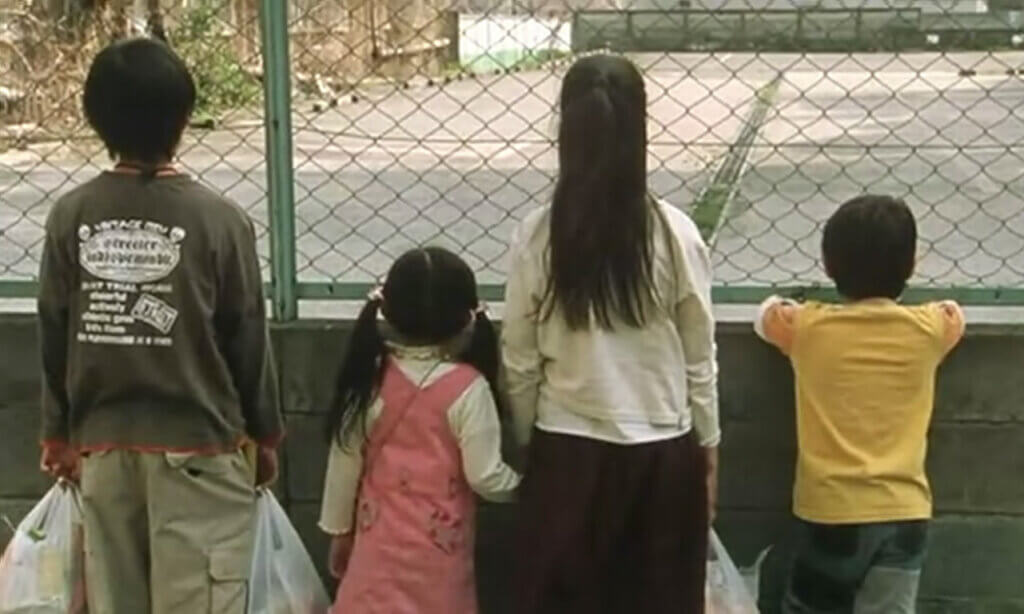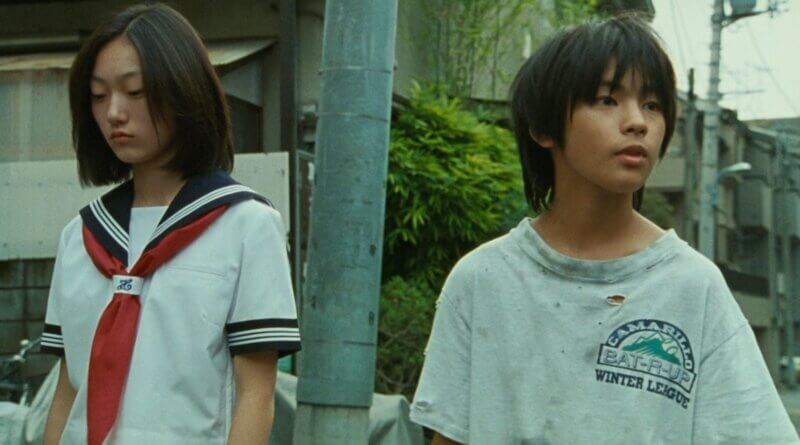Nobody Knows (2004), A Beautiful Adaptation of a Real-Life Tragedy
Presenting filial solidarity (or lack thereof) in the face of obstacles is a popular theme in dramas, though it feels like a go-to component of Japanese cinema. Isao Takahata’s harrowing animated film, Grave of the Fireflies (1988), is perhaps the most notable example; an older brother fights to keep his little sister alive through war and chaos. Another is Spirited Away (2001), in which young Chihiro travels to a strange spirit world after her parents are mysteriously turned into pigs. Yet another is Kurosawa’s Shakespearean epic, Ran (1985), which tells the story of a crumbling clan that succumbs to the ambitions and jealousies of three warring brothers. And though I’m probably waging my own little war with this assertion, I’m just going to say it — Nobody Knows (2004) might be the best of them all.
All of this is not to say that family obligations and conflicts are unique to Japanese fiction — quite the opposite. I would venture to say that most modern stories involve familial ties to one degree or another, and Hollywood arguably has an unhealthy obsession with the family unit and its indisputable virtue. But I digress.
Nobody Knows (2004) is, above all else, a film that never leaves you. This is why I find it so baffling that, despite critical acclaim upon its release, the film has fallen into relative obscurity in recent years. Much like Grave of the Fireflies, I don’t think that I will ever forget how Nobody Knows made me feel. I was disgusted, intrigued, melancholic, enraged, and completely transfixed. Miraculously, writer/director Hirokazu Kore-eda found a way to make this cold-heartened cynic ask a banal and saccharine question that I never thought would escape my lips: How could a mother be so cruel?
I watched the film with my wife, and she happened to miss the opening text stating that the film was based on a true story. Yet we both had virtually the exact same viewing experience. As the credits rolled, she was just as beaten down by the film as I was, despite assuming that it was a work of fiction, only to become even more morose when I reiterated that it was all true.
While some of the finer details of the tragic 1988 Sugamo child abandonment case were changed for the film, the meat and bones of the story remain the same. At the start, we meet a family as they move into a new apartment. The young mother introduces her 12-year-old son, Akira, to the landlord and his wife. Akira’s 11-year-old sister, Kyoko, arrives soon after by train. She is smuggled into the apartment (unbeknownst to the landlord), along with the youngest siblings, Shigeru and Yuki, who pop out of tiny suitcases unloaded from a moving truck.
» You Might Like: Trainspotting and the Dilemma of Scottish National Identity
The family lives in a kind of simple but claustrophobic happiness for a short time. Akira studies at home, but none of the other children engage much in scholarly pursuits, nor are they allowed to leave the apartment. Instead, the young ones play with their toys while the middle daughter just hangs around. At a point, the flippant mother leaves the children alone for long stretches of time, forcing Akira to take charge of the family. He tries to keep up a facade of normalcy with the little money his mother left him, buying ready-made meals from the local convenience store and carefully budgeting to pay the rent and utilities.
Just as things begin to look bleak, the mother returns with gifts and a bit more money, only to disappear again, promising to return by Christmas. But Christmas comes and goes, and the children are left with no food. The electricity and water are cut off, the landlord’s wife repeatedly asks Akira for the rent, and the children are forced to do whatever is necessary to secure their next meal and hide the secret of their abandonment.

Hirokazu Kore-eda directs the children in a way that feels very natural, despite the extremely bizarre and repulsive circumstances. Akira acts very mature for his age, but eventually, his youth catches up with him. He abandons many of the responsibilities that never should have been his in the first place. At the beginning of the film, I found myself quietly hoping that the family wouldn’t get caught in the charade, especially when the younger children began to sneak out and explore the world. But as their desperation reached a fever pitch, I was begging for someone to run to the nearest adult.
On paper, I shouldn’t have even given Nobody Knows a chance. I don’t like most films that rely heavily on child actors; I don’t appreciate stories that try to tug at my heartstrings; I’m not even a big fan of films that are, or at least claim to be based on true stories. But Nobody Knows threw out all of those preconceived notions of mine and proved to be one of the most brilliant real-life film adaptations I’ve ever seen, and perhaps will ever see in my life.
Looking beyond the sheer horror and tragedy of Nobody Knows, the film offers a unique twist on the traditional representations of family in film, Japanese or otherwise. Rather than respecting one’s parents and putting family above all else, the concept of the family unit is proven to be inherently flawed. Not everyone is cut out to be a mother or a father. Even siblings with the best of intentions can fail one another, causing unspeakable pain and misery.
The greatest films are those that can’t be adequately explained or conveyed in a review like this one. Much like the best and worst that life can throw at you, Nobody Knows must be seen to be believed. And, to be clear, the film is not some kind of twisted, sadistic thriller. It’s simply a retelling of true events, in a way that is so brutally honest and grounded in realism that it’s difficult to watch without becoming overwhelmed with emotion.
Nobody Knows is unquestionably bleak; it can make you feel as though human nature is broken beyond repair. But it is exactly the kind of film that should be required viewing. I don’t even like to use that phrase — ”required viewing” — it sounds so authoritative, and it boils a work of brilliance down to a moral obligation. But I genuinely believe that Nobody Knows is so affecting, so gut-wrenchingly beautiful and horrific, that anyone who sees it is more likely to come out with the desire to treat everyone they meet with just a little bit more kindness and love; because you really never know what people are going through, or what’s going on behind closed doors.
Nobody Knows (2004) Movie Rating: ★★★★½ out of 5
If you’d like to watch Nobody Knows (2004), the film is currently available to stream, rent, or purchase via Amazon. For more film reviews like this one, be sure to check out the Philosophy in Film homepage!

